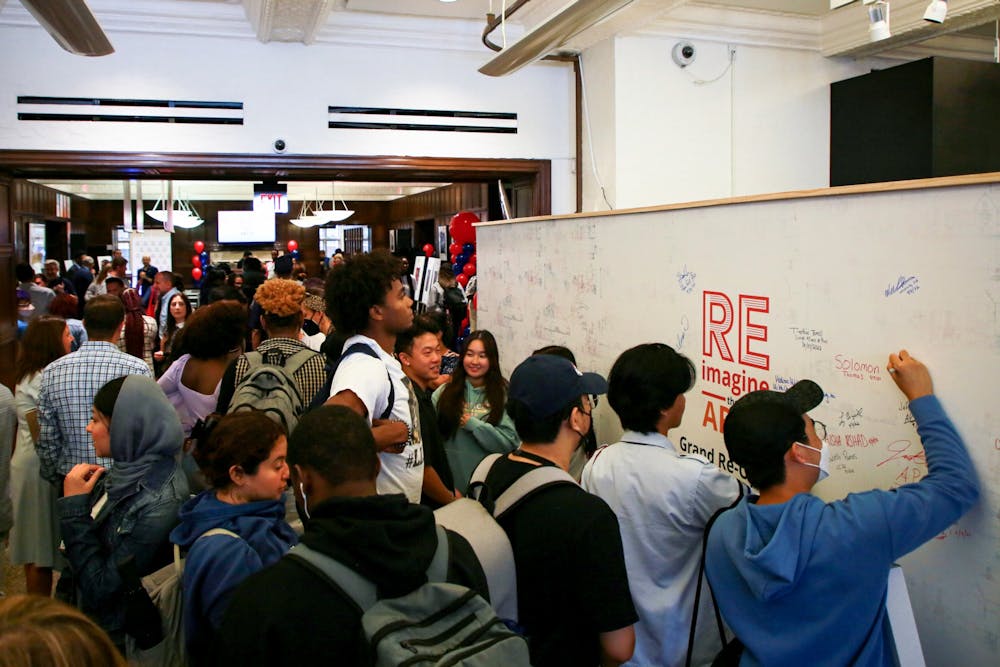
I first arrived at Penn as a transfer student in August 2021. I was one of the lucky students admitted into a pre-orientation program. I participated in PennCORP, a program designed to introduce students to social justice and community service both in West Philadelphia and on campus.
PennCORP completely changed the way that I viewed student activism and leadership. It revealed to me the injustices that Penn, Drexel, and other local universities are capable of, like the removal of Black Bottom residents and continuous "Penntricification". Furthermore, it showed me that much of the education and efforts towards revealing and reversing Penn’s injustices were spearheaded by students.
Penn and similar institutions have their students performing tasks that the universities themselves should perform, and then take credit for the fruits of their labor instead of completely serving them. Although Penn’s administrative leadership tends to present their responsibility to the student body as a reason for not involving itself directly in community affairs, the student leaders they claim to serve are not properly compensated.
Social justice has been my strongest passion for as long as I can remember. Like many other student activists, the pursuit of social change is strongly tied to my own identity. I wish to move through society with the same amount of resources and support as my peers, and I want others in similar positions to have that right as well.
To reach this goal, and to connect with more students with the same goal, we are willing to go the extra mile. That in and of itself is an amazing gift — one that institutions of power are likely to try and exploit.
These institutions describe their intentions as enriching the lives of the student body and the local community — they present themselves as a unique gift to the world. In reality, many of the Trustees we are attempting to sway to approve necessary policy changes only seek to impress and surpass their rivals at peer institutions.
Not only is there a serious problem with continuing to take away from the local community, as shouted continuously by the UC Townhomes Coalition, but nearly every impactful effort made towards reversing all of this damage has been done by the students themselves.
Those who have engaged with this work long enough know that the progress that the University's leadership tends to claim as its own often comes as a result of underpaid and underappreciated essential student labor. The most obvious examples of essential student labor are Penn’s Undergraduate Assembly and the 7B Minority Coalitions.
These students are expected to lead initiatives that the University should already have the resources and expertise to implement. Throughout the summer, a group of these student leaders were even asked to attend hours-long weekly evening meetings where they were called the ARCH Steering Committee.
While the work was done to help students further minority inclusion and connection on campus, unlike the administrators they worked with, they received no pay for this work. This situation can be quite damaging to the students themselves, especially if you consider prior studies that describe the negative impact this form of labor has on students from minority backgrounds.
As long as we continue to debate the merits of unpaid internships, the conversation should extend to positions of leadership and activism that require students to serve as administrators just as much as they are expected to be as students. Students should have the opportunity to advocate for their peers, make a positive impact in the local community, and gain valuable leadership experiences.
But, the University administrative leadership must give its student leaders the pay and credit that they deserve. This is the least that they can do, seeing as it appears that they do not intend to take responsibility for the harm they have caused and reverse the damage done to West Philadelphia on their own.
In other words, if we are going to do the work for this institution, then they should pay us what we are worth.
TIMETHIUS J. TERRELL is a College junior from middle Georgia studying psychology. His email is timet@sas.upenn.edu.
The Daily Pennsylvanian is an independent, student-run newspaper. Please consider making a donation to support the coverage that shapes the University. Your generosity ensures a future of strong journalism at Penn.
Donate




